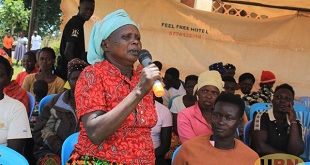
Kampala, Uganda | THE INDEPENDENT | Civil Society Organisations-CSOs in West Nile region have raised an alarm over the high levels of alcohol consumption in the region. A survey conducted by Arua District NGO Network-ADINGON shows that alcohol intake in the region stands at 75 percent with men taking the lead in Madi Okollo, Terego in Arua, Maracha and Moyo, Adjumani districts.
The CSOs note that the heavy alcohol intake is affecting productivity in households, which may lead to food insecurity in the region. Twaib Feni, the Coordinator Arua District NGO Network-ADINGON, says there is urgent need to curb and reduce the high alcohol intake among residents, which he says is largely connected to idleness.
“As civil society, we strongly demand that government intervenes to engage the people in income generating activities, so that they are not idle and taken by alcohol,” said Feni.
He asks both the central and local governments to redirect resources to engage residents in productive activities to curb the high alcohol consumption. Lillian Aleni, an anti-alcohol activist, says women are now shouldering the burden of providing for their households because of excessive alcohol consumption among men.
Collins Mawa, an opinion leader in Arua, says the high alcohol consumption in the region has not only impacted negatively on the economic well being of families but also led to increased school dropout rates and family break ups.
On September 23rd, 2019, cabinet approved a ban on the production and sale of sachet waragi drawing protests from some cultural organizations on grounds that it’s a socializing factor for their people and a means of income that shouldn’t be brought to an abrupt end.
The Arua LC V Chairman, Sam Wadri Nyakua, says the health condition of some of the alcohol consumers is pathetic and requires urgent intervention by development partners and security personnel.
Harold Acemah, a retired diplomat, says government’s move to ban sachet alcohol consumption is a waste of time, saying it should instead embark on legislating on issues of fighting poverty among the poor who are the immediate victims of alcohol consumption.
“First address the root causes of high alcohol consumption like poverty, idleness and have the people engaged in productive activities,” said Acemah. Recently, Arua District council passed the alcohol ordinance, which prohibits among others the sale, and distribution of sachet waragi and its consumption during working hours.
The ordinance is awaiting approval by the Attorney General before it comes into force. According to the Global ranking, Uganda stands at number seven in alcohol consumption with an average intake of 9.5 liters of per person per day.
*****
URN
 The Independent Uganda: You get the Truth we Pay the Price
The Independent Uganda: You get the Truth we Pay the Price



